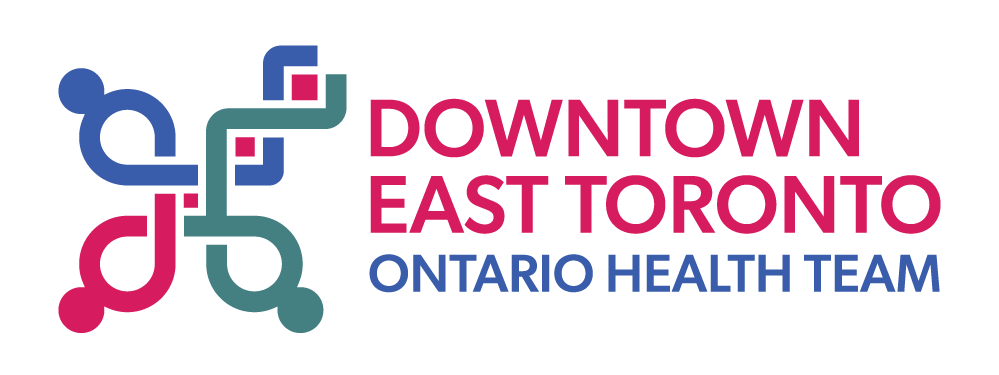
Our Work
Population Focus
The work of the DET OHT is currently focused on improving health care outcomes and experiences for two priority populations:
- People experiencing homelessness
- Adults 18+ years (16+ if applicable) with mental health symptoms who would benefit from counselling or psychotherapy in addition to or instead of medication
View our 2023-26 Strategic Plan
Working Groups
Mental Health and Addictions (MHA)
The vision of this working group is to enhance the care pathways for timely and non-stigmatizing MHA support, delivered in an accessible way. The MHA working group strives to leverage the strengths of care providers and local communities, and co-design its programs and change initiatives with patients and caregivers with lived experience for inclusive care delivery.
Change Initiatives
Stepped Care Pilot: This model supports family doctors to connect their patients with trauma, anxiety, and/or depression to psychotherapy and counseling services tailored to their needs. The MHA working group and the Stepped Care Oversight Committee is running this pilot to identify the care gaps and evaluate effective and evidence-based solutions that enhances positive patient-reported experience and outcomes.
To read more, click here.
People Experiencing Homelessness (PEH)
This working group is dedicated to addressing and alleviating the challenge of precarious housing. Multidisciplinary experts and community members with lived experience collaborate on change initiatives and programs to understand the complex issues surrounding precarious housing and explore meaningful interventions.
Change Initiatives
Drop-ins Service Provider Team Pilot Project: The DET OHT has collaborated with the Toronto Drop-in Network to bring low-barrier access to health services for people with precarious housing. Each week, on-site health service teams including nurses, case managers, outreach workers, a social worker and harm reduction workers go to three drop-in centres in downtown Toronto to provide care. Read More.
Improved Transition and Navigation (Emergency Department Outreach Worker Program): In a step towards supporting patients at the St. Michael’s Hospital Emergency Department with challenges beyond health, this program assigns a dedicated outreach worker to those experiencing deep poverty. The outreach worker supports patients with securing housing, ensuring access to meals, finding sustainable sources of income, and, if required, providing legal assistance. Read More.
High Density Housing – 292 Parliament Pilot Project: Details coming soon.
Rapid Access to Crisis Support for People who Use Substances: Details coming soon.
Digital
The mandate of the Digital working group is to ensure necessary and appropriate digital health technologies are in place to provide the infrastructure for equitable access and an integrated health system. The working group also advises on matters related to data privacy and legislation, secure information exchange, IT architecture, and cyber security.
Change Initiatives
Digital Shared Care System: The aim of this pilot is to digitally connect a health information custodian (HIC) and a non-HIC to exchange patient/client information in a safe and timely manner that adheres to all privacy legislation to address gaps in care, improve efficiency and provide a better care experience. Read More.
Online Appointment Scheduling and Patient Engagement: To enhance convenience for physicians, nurse practitioners, and allied health providers in the downtown core, this change initiative has provided access to a digital appointment scheduling and patient engagement tool by supporting them with license funding and IT infrastructure maintenance. To date, over 180 providers have benefitted from this initiative.
Performance, Measurement & Quality Improvement (PMQI)
The PMQI working group supports continuous quality improvement across all programs and change initiatives of the DET OHT by supporting evaluation and performance measurement and KPI reporting.
Additional Projects
Interprofessional Primary Care Team (IPCT)
The IPCT project is a primary care initiative of DET OHT, aiming to enhance access and attachment to interprofessional, team-based primary care for individuals in Downtown East Toronto experiencing significant financial and social barriers. These populations include people experiencing housing insecurity, 2SLGBTQIA+ community, refugees, people with disabilities, and individuals who use drugs. The project places a specific emphasis on addressing the unique needs of Indigenous and Black communities.
To read more, click here.
Lower-Limb Preservation
To support Ontario Health’s Lower-Limb Preservation Strategy (LLPS), the DET OHT has designed and is in the process of implementing the lower-limb care pathways by bringing together primary and community care, specialized foot and wound care, and acute care. The strategy aims to:
- Reduce preventable, non-traumatic major lower limb amputations across Ontario.
- Improve equitable lower-limb care pathways for early identification, cardiovascular risk factor, diabetes management, and wound care.
To read more, click here.
Click here to sign up to receive updates from the Downtown East Toronto Ontario Health Team.
